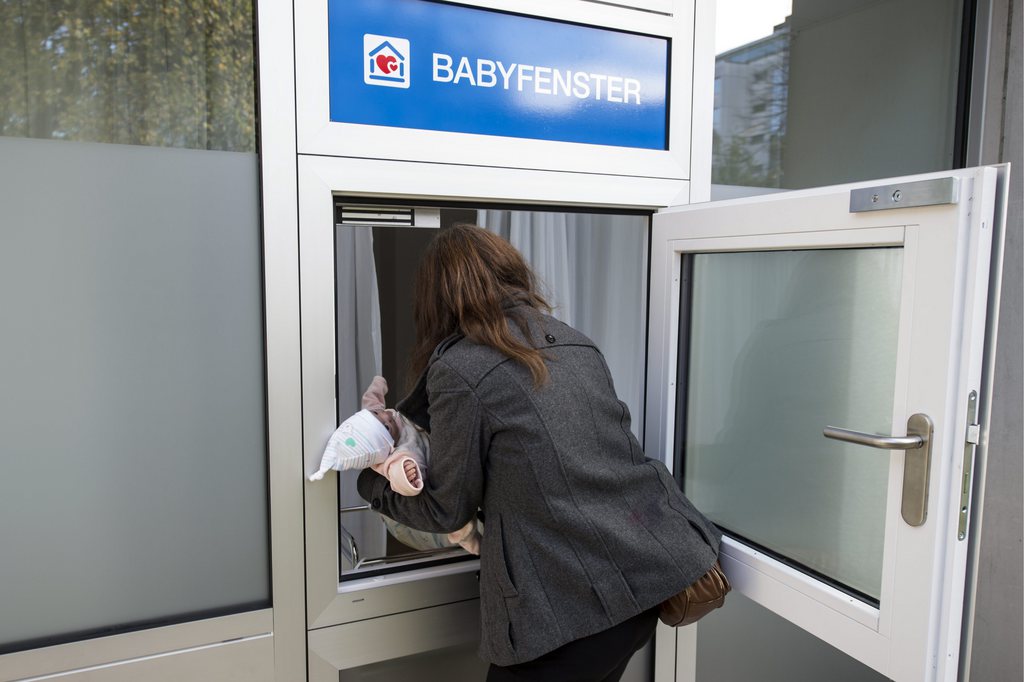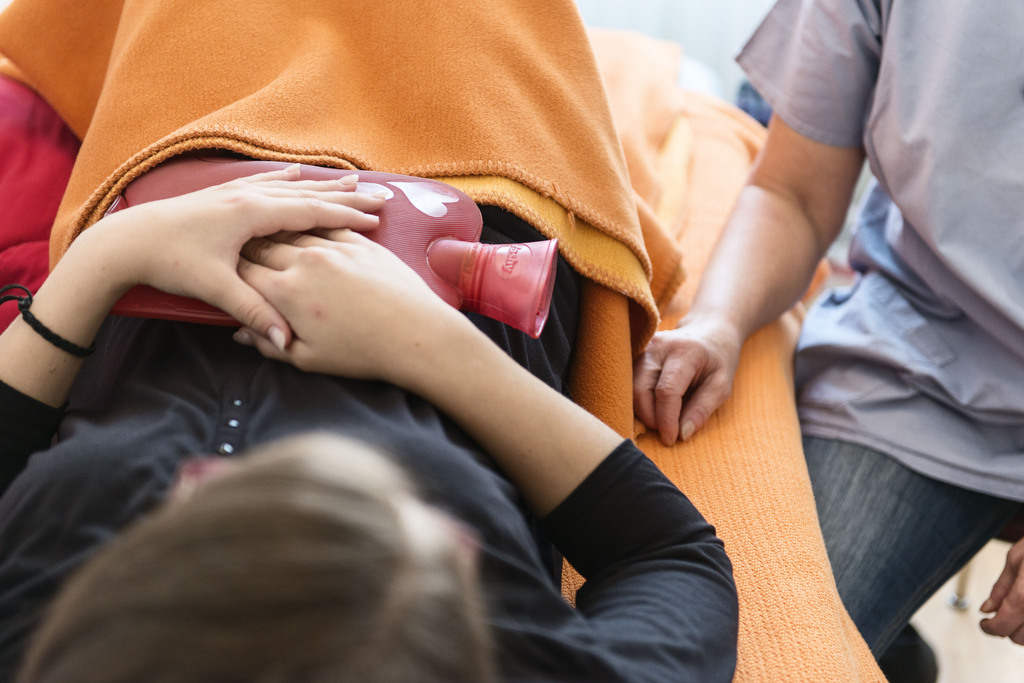Number of ‘baby-hatches’ grows despite controversy

The expansion of facilities where newborns can be safely abandoned has become a matter of controversy in Switzerland. Advocates see it as the only way to save babies’ lives, while others object that it violates their right to an identity.
Baby-hatches (also known as ‘baby-boxes’ or ‘baby-windows’) are something of a legal grey area, and they have aroused criticism on ethical, medical and social grounds. Yet at the moment they seem to be on the increase in Switzerland.
Up until June 2012 there was just one baby-hatch in the whole country, at Einsiedeln hospital in canton Schwyz. It was inaugurated in May 2001 at the initiative of Swiss Aid for Mother and Child (SAMC), a foundation that opposes abortion and offers advice and assistance to women and families who find themselves in difficulty due to a pregnancy or the birth of a child.
In the past 18 months another three baby-hatches have been installed, in Davos, Olten and Bern. Soon there will be a further three, in Ticino, Valais and Zurich. In other cantons, legislation which would provide for them is pending.
This indicates that “there is clearly a need”, Justice Minister Simonetta Sommaruga told parliament in December, responding to a question from senator Liliane Maury Pasquier. “But it is also clear that, with baby-hatches, many problems remain unresolved,” noted the minister.

More
Swiss to vote on funding of abortion
Emotional reaction
“There is a powerful degree of emotion – without reason being involved – pushing for the adoption of these devices with the aim of saving newborns,” Maury Pasquier told swissinfo.ch.
In Switzerland infanticides and abandonment of newborns in public places are rare, but any occurrence of the phenomenon disturbs public opinion.
It was cases of this kind that spurred requests to create baby-hatches. Politicians and medical and health officials then turned to the SAMC, according to its president Dominik Müggler.
The first baby-hatch outside German-speaking Switzerland will go into service at the end of March 2014 at the regional hospital in Bellinzona. This decision was carefully weighed up, says the hospital’s director, Sandro Foiada.
An objective evaluation was carried out which involved meetings with Müggler and managers of the existing baby-hatches, and a discussion involving the appropriate medical, administrative and political authorities.
Mothers unsupported
Foiada is aware of the problems that remain unresolved with the hatch, but he notes that “we must be pragmatic and not shut our eyes to reality. The abandonment of newborns exists, and if this hatch helps us save even one, it will be worth the effort”.
Yet strong opposition to the arrangement is coming from Sexual Health Switzerland. The organisation, which promotes family planning and sex education, sent a letter to all directors of public health and parliaments of cantons last July exhorting them to “(re)examine critically the provision of this kind of service”.
“It is of fundamental importance, for the mother herself but also for the baby, to have access to all health services, before, during and after birth. Basic conditions should be ensured in which she can be cared for and supported from the medical, psychological and social point of view. With a hatch for newborns, this is totally lacking,” argues Mirta Zurini, an independent consultant to the organisation.
Baby-hatches are provided by hospitals in collaboration with the charity, Swiss Aid for Mother and Child (SAMC), which assumes all costs, including those for the baby until its adoption.
The hatch opens from the outside. The mother places the baby in the warmed crib on the inside and takes the “letter to the mother”. She recloses the hatch and leaves the area unseen. In the meantime an alarm has rung and after about three minutes the newborn is taken into the care of the health staff. After a few days it is given into foster care. Later it will be given up for adoption. The biological mother and father have the right to take the child back up to the point where adoption takes effect, which is at least a year’s time.
In the letter to the mother, free advice is offered, as is medical consultation, which is recommended, and also financial support. All information needed to get in touch with the hospital, SAMC or the child protection authorities is provided, and the mother is informed of her rights.
Since May 13 2001, when it was installed, the baby-hatch in Einsiedeln has had eight babies left there. Only in one case did the mother take back the child. Mothers of five of the babies made known their particulars to the child protection authorities or SAMC.
So far no newborns have been left in the baby-hatches of Davos, Olten or Bern.
SAMC has calculated that in Switzerland eight to ten baby-hatches are needed, one in each region of the country. The foundation does not finance those it does not consider necessary, says its president, Dominik Müggler.
There is pending legislation to establish one in Basel Country, but if a decision were taken in that direction SAMC would not fund it because it believes the one in Olten, in neighbouring canton Solothurn, is easy to reach from Basel Country. It also views as superfluous a second baby-hatch under discussion in Bern. In such cases it would be up to the state to take on the costs.
Giving birth confidentially
All this support is in fact offered by what is known as “confidential” or “discreet” giving of birth, which allows for the woman to be cared for by a team of health professionals during the pregnancy and to give birth in a hospital without third parties being informed.
The mother also receives advice on her options and her rights in giving the child up for adoption.
The problem is that “most of the public do not know about confidential birthing and thus do not see any alternative to baby-hatches”, explains Maury Pasquier who has put a proposal to parliament that information about this option be more widely available.
The Social Democrat senator from Geneva is now calling for the government to present a complete review of the situation as regards baby-hatches and other kinds of support to women in difficulties and, if necessary, to take action, together with the cantons and organisations involved.
“I hope that this will lead to a discussion of confidential birthing and thus spread the information among the public at large,” the trained midwife says.
Giving birth anonymously
All sides agree on confidential birthing. “We are fully in agreement that we should step up provision of information on the option of giving birth in a confidential manner,” states the director of Sexual Health Switzerland, Anita Cotting.
SAMC president Müggler is on the same wavelength: “We have always clearly said that we are in favour of all the options that make giving of birth easier. We are favourable both to confidential birthing, and to anonymous birthing,” he emphasises.
As distinct from confidential birthing, in which particulars of the mother are made known to the appropriate authorities and the child once an adult can find out who she is, anonymous birthing has so far been opposed in Switzerland by defenders of the right of every individual to know his own biological origins.
However, in responding to Pasquier’s question, the government has stated explicitly that there should be “an evaluation of the appropriateness of providing the option of giving birth while maintaining anonymity”.
This is an option which the group, Sexual Health Switzerland, would be “ready to accept if the woman is supported correctly at the medical and psycho-social level”, says Cotting.
In any case this would require an appropriate legal framework, as minister Sommaruga reminded parliament. So the legalisation of anonymous birthing in Switzerland is not around the corner.
(Translated from Italian by Terence MacNamee)

In compliance with the JTI standards
More: SWI swissinfo.ch certified by the Journalism Trust Initiative










You can find an overview of ongoing debates with our journalists here . Please join us!
If you want to start a conversation about a topic raised in this article or want to report factual errors, email us at english@swissinfo.ch.